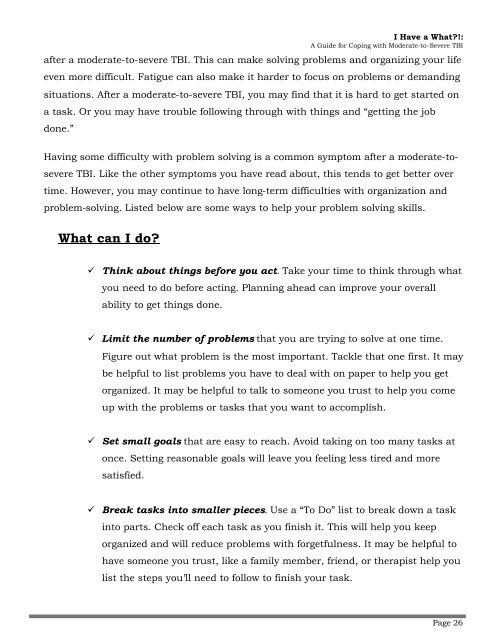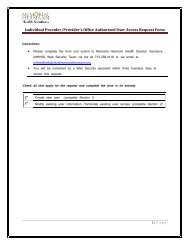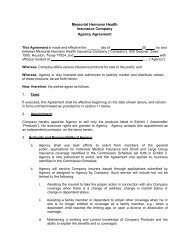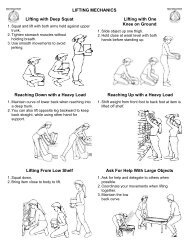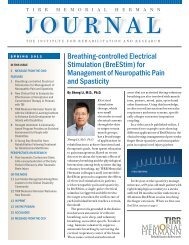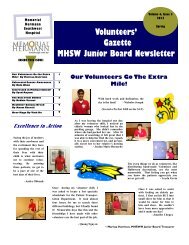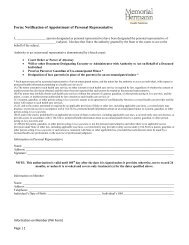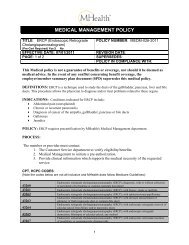I Have a What? A Guide for Coping with Moderate-to-Severe TBI
I Have a What? A Guide for Coping with Moderate-to-Severe TBI
I Have a What? A Guide for Coping with Moderate-to-Severe TBI
- No tags were found...
Create successful ePaper yourself
Turn your PDF publications into a flip-book with our unique Google optimized e-Paper software.
I <strong>Have</strong> a <strong>What</strong>?!:A <strong>Guide</strong> <strong>for</strong> <strong>Coping</strong> <strong>with</strong> <strong>Moderate</strong>-<strong>to</strong>-<strong>Severe</strong> <strong>TBI</strong>after a moderate-<strong>to</strong>-severe <strong>TBI</strong>. This can make solving problems and organizing your lifeeven more difficult. Fatigue can also make it harder <strong>to</strong> focus on problems or demandingsituations. After a moderate-<strong>to</strong>-severe <strong>TBI</strong>, you may find that it is hard <strong>to</strong> get started ona task. Or you may have trouble following through <strong>with</strong> things and “getting the jobdone.”Having some difficulty <strong>with</strong> problem solving is a common symp<strong>to</strong>m after a moderate-<strong>to</strong>severe<strong>TBI</strong>. Like the other symp<strong>to</strong>ms you have read about, this tends <strong>to</strong> get better overtime. However, you may continue <strong>to</strong> have long-term difficulties <strong>with</strong> organization andproblem-solving. Listed below are some ways <strong>to</strong> help your problem solving skills.<strong>What</strong> can I do?Think about things be<strong>for</strong>e you act. Take your time <strong>to</strong> think through whatyou need <strong>to</strong> do be<strong>for</strong>e acting. Planning ahead can improve your overallability <strong>to</strong> get things done.Limit the number of problems that you are trying <strong>to</strong> solve at one time.Figure out what problem is the most important. Tackle that one first. It maybe helpful <strong>to</strong> list problems you have <strong>to</strong> deal <strong>with</strong> on paper <strong>to</strong> help you ge<strong>to</strong>rganized. It may be helpful <strong>to</strong> talk <strong>to</strong> someone you trust <strong>to</strong> help you comeup <strong>with</strong> the problems or tasks that you want <strong>to</strong> accomplish.Set small goals that are easy <strong>to</strong> reach. Avoid taking on <strong>to</strong>o many tasks a<strong>to</strong>nce. Setting reasonable goals will leave you feeling less tired and moresatisfied.Break tasks in<strong>to</strong> smaller pieces. Use a “To Do” list <strong>to</strong> break down a taskin<strong>to</strong> parts. Check off each task as you finish it. This will help you keeporganized and will reduce problems <strong>with</strong> <strong>for</strong>getfulness. It may be helpful <strong>to</strong>have someone you trust, like a family member, friend, or therapist help youlist the steps you’ll need <strong>to</strong> follow <strong>to</strong> finish your task.Page 26


